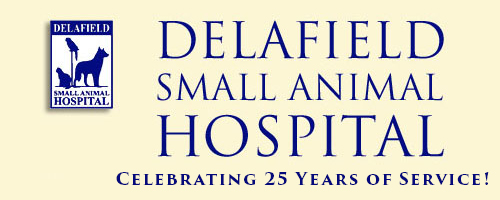Delafield, WI veterinary services – delivered with courtesy and respect!
Our Facility
Our facility offers complete veterinary services including medical, surgical, dental, and boarding. The Delafield Small Animal Hospital was built from the ground up and opened in May of 1996. The clinic carries numerous prescription diets from top providers such as Iams, Hills, Purina, and Royal Canin. We carry flea, tick, and heartworm prevention; endorsing such products as Frontline, Advantage, Interceptor, and Heartgard. We also stock dental, grooming and nutritional supplies to help keep your animal clean and healthy.
Physical Examinations
Your pet’s eyes, ears, skin, including mouth, teeth, and gums are checked. Also, skeletal, gastrointestinal, and nervous systems are examined. If it is deemed necessary, urine samples, blood work, or other tests can be run or sent to an outside testing facility.
Insect Born Disease
Insect born diseases are much more easily prevented than treated, so prevention is a must.
- Ticks – Difficult to see, ticks will attach to pets and feed on the blood. They thrive all over the country and may carry and transmit diseases, including Lyme disease that can cause major health risks for pets and people.
- Fleas – Few creatures can inflict more discomfort than fleas. These almost invisible pests can make life miserable and disrupt your home with vicious biting and scratching. Fleas can also cause allergy dermatitis in certain animals and be carriers of dangerous disease.
- Heartworm – Once a parasite of warmer climates, the heartworm (Dirofilaria immitis) has become a major threat affecting pets everywhere. A simple monthly dose of heartworm prevention is all your pet needs to avoid the cost and pain of treating an infected animal.
Vaccinations
Pets can be protected from some diseases by vaccination. Your veterinarian is the best source for guidance regarding your pet’s individual vaccination needs.
Neutering and Spaying
In spaying, your female dog or cat’s fallopian tubes, ovaries, and uterus are removed. In neutering a male dog or cat, the testicles are taken. Both procedures may be performed approximately six months of age. In addition to saving lives, neutering and spaying can dramatically improve pet’s health and overall life expectancy. Sterilized pets lead longer and healthier lives. Spaying a female eliminates chances of uterine and ovarian cancer and also reduces risks of breast cancers. Neutering a male reduces the risk of prostate cancer in dogs and marking behaviors. Neutering can also make your pet behave more affectionately and be less likely to roam or become lost.
Skin and Coat
Healthy skin and coat are the result of different factors. When cats and dogs experience allergies, they don’t have the same problems as humans. Their allergies will affect the skin. Pets often will chew, lick, or scratch in response to allergens. At times, a pet’s itching has nothing to do with allergies and may be from other conditions.
Delafield Small Animal Hospital
- Bumps and Lumps – Cats and dogs can develop small bumps or lumps on their epidermis. The list of causes is extensive, so a quick diagnosis is necessary but may be difficult to assess. Diagnostic tests such as biopsies may need to be performed and treatment can be simple or complex.
- Rashes and Itching – Rashes can be the result of bacterial or parasitic infections, allergies, or other causes. A prompt diagnosis and care can make a major difference in alleviating discomfort and your pet’s overall health.
- Ears – Is your pet shaking it’s head, scratching it’s ears, or seem very irritable in that region? If so, they could be suffering from a possible ear infection. Ear infections are caused by a lot of factors such as ear mites, yeast, or bacterial infestations, food allergies, environmental allergies, or hygiene. These infections call for immediate medical attention to isolate the cause and contain the spread of infection.
Dental Hygiene
- Bad Breath? This is not a normal occurrence, bad breath is a sign of tooth and gum disease. The odor emanates from disease causing bacteria living underneath the gum line. Infected gums and teeth can be painful for a cat or dog. Decreased activity or play behavior, decreased appetite or taking longer to eat meals can be other signs. Some pets will continue to eat normally with painful mouths and owners are not aware that their pets are in extreme pain.
- Hard or Soft food? Crunchy, hard foods help scrape plaque from your pet’s teeth. Certain diets such as Hills Oral Care are designed specifically to increase the time needed between dental cleanings. Toys and treats that stimulate chewing also help keep teeth clean. Extremely hard chew toys and bones often result in broken teeth and painful mouths.
- Is Dental Care Neccesary? Tooth brushing offers the best results for teeth that are already clean. By the time mineral deposits build up on teeth and the gums are infected, professional care by a licensed veterinarian is recommended. Bacteria can enter the blood stream from infected teeth and gums, and can attach to heart valves resulting in severe heart disease or kidney and liver infections. These are expensive conditions to treat so like in humans, the best alternative is early prevention! A dental cleaning involves a complete oral exam under anesthesia, hand and ultrasonic scaling, tooth polishing, and a possible application of sealant called OraVet. A healthy mouth is an odor and pain free mouth, and your pets can live longer and better lives with you and your family.
